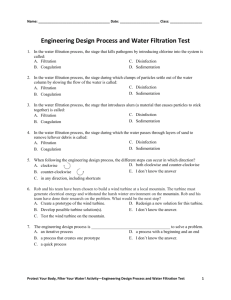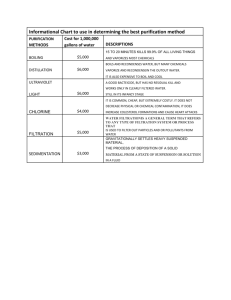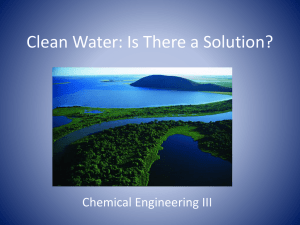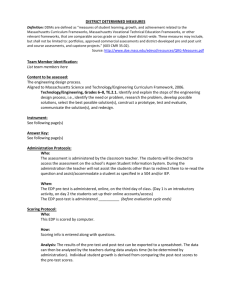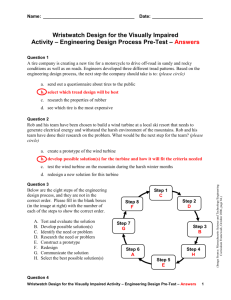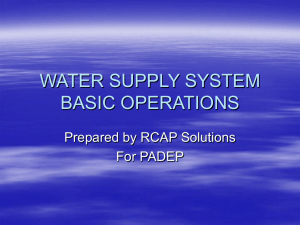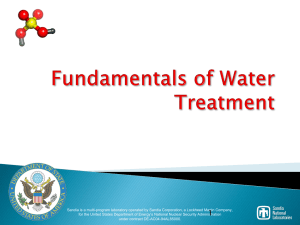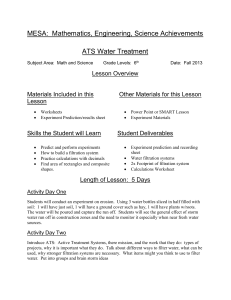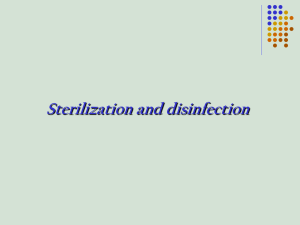Engineering Design Process and Water Filtration Pre/Post
advertisement
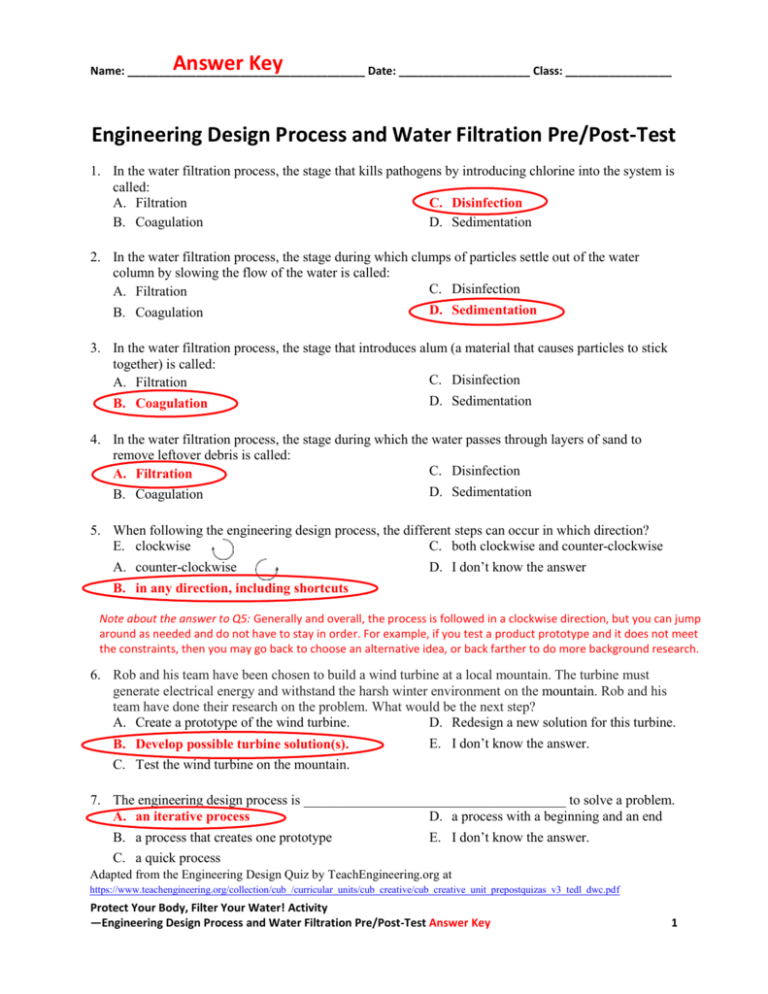
Answer Key Name: ______________________________________ Date: _____________________ Class: _________________ Engineering Design Process and Water Filtration Pre/Post-Test 1. In the water filtration process, the stage that kills pathogens by introducing chlorine into the system is called: A. Filtration C. Disinfection B. Coagulation D. Sedimentation 2. In the water filtration process, the stage during which clumps of particles settle out of the water column by slowing the flow of the water is called: C. Disinfection A. Filtration B. Coagulation D. Sedimentation 3. In the water filtration process, the stage that introduces alum (a material that causes particles to stick together) is called: C. Disinfection A. Filtration D. Sedimentation B. Coagulation 4. In the water filtration process, the stage during which the water passes through layers of sand to remove leftover debris is called: C. Disinfection A. Filtration D. Sedimentation B. Coagulation 5. When following the engineering design process, the different steps can occur in which direction? E. clockwise C. both clockwise and counter-clockwise A. counter-clockwise D. I don’t know the answer B. in any direction, including shortcuts Note about the answer to Q5: Generally and overall, the process is followed in a clockwise direction, but you can jump around as needed and do not have to stay in order. For example, if you test a product prototype and it does not meet the constraints, then you may go back to choose an alternative idea, or back farther to do more background research. 6. Rob and his team have been chosen to build a wind turbine at a local mountain. The turbine must generate electrical energy and withstand the harsh winter environment on the mountain. Rob and his team have done their research on the problem. What would be the next step? A. Create a prototype of the wind turbine. D. Redesign a new solution for this turbine. B. Develop possible turbine solution(s). C. Test the wind turbine on the mountain. E. I don’t know the answer. 7. The engineering design process is ______________________________________ to solve a problem. D. a process with a beginning and an end A. an iterative process B. a process that creates one prototype E. I don’t know the answer. C. a quick process Adapted from the Engineering Design Quiz by TeachEngineering.org at https://www.teachengineering.org/collection/cub_/curricular_units/cub_creative/cub_creative_unit_prepostquizas_v3_tedl_dwc.pdf Protect Your Body, Filter Your Water! Activity —Engineering Design Process and Water Filtration Pre/Post-Test Answer Key 1 Name: ______________________________________ Date: _____________________ Class: _________________ Below are the steps of the engineering design process and they are not in the correct order. Indicate the correct order in the circular diagram by filling in the blank boxes with the letter of each step. A. B. C. D. Test and evaluate the solution. Develop possible solution(s). Identify the need or problem. Research the need or problem. E. F. G. H. Construct a prototype. Redesign. Communicate the solution. Select the best possible solution(s). If you do not know what to put in the box for a step, leave it blank. Identify the need or problem. Step 1 C Step 8 Communicate the solution. Test and evaluate the solution. Step 2 F Redesign. Research the need or problem. D Step 7 Step 3 G B Step 6 Step 4 A H Develop possible solutions. Select the best possible solution(s). Step 5 E Construct a prototype. Source: Steps of the Engineering Design Process, Massachusetts Science and Technology/Engineering Curriculum Framework, Massachusetts Department of Education, October 2006, page 84, http://www.doe.mass.edu/frameworks/scitech/1006.pdf Protect Your Body, Filter Your Water! Activity —Engineering Design Process and Water Filtration Pre/Post-Test Answer Key 2 Name: ______________________________________ Date: _____________________ Class: _________________ 8. John needs to create a boat out of a 20 gram ball of clay. His boat must float and hold 10 marbles. He will follow the steps of the engineering design process to guide him to do this. For each of John’s activities listed below, indicate what step of the design process it represents. A. Test and evaluate the solution E. Construct a prototype B. Develop possible solution(s) F. Redesign C. Identify the need or problem G. Communicate the solution D. Research the need or problem H. Select the best possible solution(s) If you do not know what EDP step to put next to John’s activity, leave it blank. G John reports and discusses his findings about the clay boat. F John makes changes to his design based on testing results and feedback. D John finds out how boats are made, characteristics of boats and clay, and what makes something buoyant. B John creates multiple plans for a boat. E John works with the clay to form it into a shape that can hold 10 marbles and maintain buoyancy. John decides, based on his research, what boat design is best to be able to hold 10 marbles and float. H C Using a 20 g ball of clay, John must make a boat that can float and hold 10 marbles. A John tries to the float the boat with 10 marbles in it. He notes how well it works and any issues that come up. 9. A student group bought a box of ice pops to take to their ball game to sell on a hot day. They know they need a device to keep the ice pops from melting for three hours. They have a $15 budget. Which step of the engineering design process does this show? A. B. C. D. E. Identify a problem. Test and evaluate. Redesign. Develop possible solutions. I don’t know the answer. 10. Which of the following is part of the testing and evaluation stage of designing a cell phone? A. B. C. D. E. Writing an advertisement for the cell phone. Defining the specifications for the cell phone. Finding a new material for the cell phone case. Trying to see if cell phone is waterproof. I don’t know the answer. Adapted from the High School Technology/Engineering Test; XXI. Technology/Engineering, High School; Massachusetts Department of Education, 2011, at http://www.doe.mass.edu/mcas/2011/release/ghstecheng.pdf Protect Your Body, Filter Your Water! Activity —Engineering Design Process and Water Filtration Pre/Post-Test Answer Key 3
